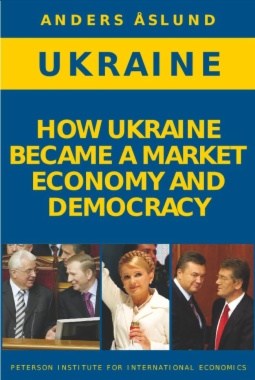One of Europe's old nations steeped in history, Ukraine is today an undisputed independent state. It is a democracy and has transformed into a market economy with predominant private ownership. Ukraine's postcommunist transition has been one of the most protracted and socially costly, but it has taken the country to a desirable destination.
Åslund's vivid account of Ukraine's journey begins with a brief background, where he discusses the implications of Ukraine's history, the awakening of society because of Mikhail Gorbachev's reforms, the early democratization, and the impact of the ill-fated Soviet economic reforms. He then turns to the reign of President Leonid Kravchuk from 1991 to 1994, the only salient achievement of which was nation-building, while the economy collapsed in the midst of hyperinflation. The first two years of Leonid Kuchma's presidency, from 1994 to 1996, were characterized by substantial achievements, notably financial stabilization and mass privatization. The period 1996–99 was a miserable period of policy stagnation, rent seeking, and continued economic decline. In 2000 hope returned to Ukraine. Viktor Yushchenko became prime minister and launched vigorous reforms to cleanse the economy from corruption, and economic growth returned. The ensuing period, 2001–04, amounted to a competitive oligarchy. It was quite pluralist, although repression increased. Economic growth was high. The year 2004 witnessed the most joyful period in Ukraine, the Orange Revolution, which represented Ukraine's democratic breakthrough, with Yushchenko as its hero. The postrevolution period, however, has been characterized by great domestic political instability; a renewed, explicit Russian threat to Ukraine's sovereignty; and a severe financial crisis. The answers to these challenges lie in how soon the European Union fully recognizes Ukraine's long-expressed identity as a European state, how swiftly Ukraine improves its malfunctioning constitutional order, and how promptly it addresses corruption.
- Cover
- Contents
- Preface
- Acknowledgments
- Map
- Key Facts
- Government
- People
- Geography
- Economy
- Introduction
- Main Arguments of the Book
- Structure of the Book
- Chapter 1 Ukraine: Nation, History, and Soviet Reforms
- A Proud but Tragic National Legacy
- Society Wakes Up under Gorbachev
- Impact of Soviet Economic Reforms and Crisis
- Chapter 2 Leonid Kravchuk: Nation-Building and Hyperinflation, 1991-94
- National Independence
- Kravchuk as President
- Liberation from Russia
- Ukraine’s Denuclearization
- The Grand Bargain of Ukraine’s New Political Forces
- Nationalist Economic Policy with Little Thought
- Prime Minister Kuchma: Aborted Reform
- Prime Minister Zviahilskiy: Unabashed Rent Seeking
- Hyperinflation and Economic Disaster
- Rent Seeking: Rationale of Ukraine’s Early Economic Policy
- Crimea: Threat of Secession
- Kravchuk: Father of the Nation
- Chapter 3 Leonid Kuchma’s Reforms, 1994-96
- Parliamentary Elections, Spring 1994
- Presidential Elections, June– July 1994
- Kuchma Proclaims Radical Economic Reforms
- Financial Stabilization and Liberalization
- Currency Reform, September 1996
- Privatization Takes Off
- Adoption of the New Constitution, June 1996
- Economic Policy Reversal
- Limited but Effective International Assistance
- Kuchma Saved His Country
- Chapter 4 Kuchma’s Stagnation, 1996– 99
- Lazarenko’s Excesses
- Pynzenyk’s Abortive Program for Economic Growth
- Pustovoitenko: Passive Loyalist
- Kuchma’s Foreign Policy
- Intricacies of the Gas Trade
- Rise of the Oligarchs
- Crime and Law Enforcement
- Demise of Media Freedom
- Parliamentary Elections, March 1998
- Kuchma’s Reelection, October– November 1999
- Underreform Trap
- Chapter 5 Viktor Yushchenko’s Reforms, 2000
- On the Verge of Default
- Oligarchs Opt for a Reform Government
- Government Reform
- Financial Cleansing and the Defeat of Barter
- Energy Trade Cleaned Up
- Agricultural Land Privatization
- Privatization of Large Enterprises
- Deregulation of Small Firms and Anticorruption Measures
- The Gongadze Murder and “Kuchmagate”
- Yushchenko’s Ouster
- A Severe Break in the Rent-Seeking Society
- Chapter 6 Competitive Oligarchy with High Growth, 2001-04
- The Kinakh Government
- Organization of a Strong Center-Right Opposition
- The March 2002 Parliamentary Elections
- The Yanukovych Government
- Controversial Privatization of Kryvorizhstal
- Economic Boom
- Putin’s Policy on Ukraine: Gas Trade, Common Economic Space, and the Tuzla Incident
- NATO and the European Union’s European Neighborhood Policy
- Chapter 7 The Orange Revolution, 2004
- Options of the Old Regime
- Mobilization of the Opposition and Civil Society
- The Regime: Mobilized but Divided
- Russia’s Role
- The Election Campaign: Yushchenko versus Yanukovych
- The Presidential Elections
- The Orange Revolution
- The Settlement
- Assessment of the Orange Revolution
- Chapter 8 Aftermath of the Orange Revolution, 2005-08
- Formation of an Orange Coalition
- Ukraine Turns to Europe
- The Tymoshenko Government: Reprivatization
- The Yekhanurov Government: Return to Order
- Russia Disrupts Gas Deliveries: Higher Prices
- Parliamentary Elections, March 2006
- The Second Yanukovych Government: Oligarchy Restored
- Dissolution of Parliament and New Parliamentary Elections, September 2007
- The Second Tymoshenko Government: Stalement
- WTO Accession, May 2008
- NATO Controversies and Russia’s War in Georgia
- Renewed Financial Crisis and IMF Agreement
- Yushchenko Insists on New Elections
- Limited Social Achievements
- Chapter 9 Lessons from Ukraine’s Transformation
- Constitutional Evolution and Shortcomings
- Why Ukraine’s Capitalist Transformation Succeeded
- Role of the IMF
- Impact of the Oligarchs
- Will Ukraine’s Democracy Survive?
- European Economic Convergence
- Putin’s Alienation: Ukraine Turning to the West
- Bibliography
- Brief Biographies of Leading Politicians and Businessmen
- Chronology
- Abbreviations
- Index

